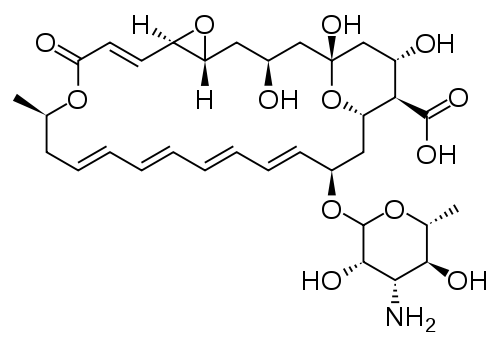All AbMole products are for research use only, cannot be used for human consumption.

Natamycin (also known as Pimaricin, Natacyn) is a naturally occurring antifungal agent. In the bioautographic study, the antibiotic activity of natamycin was restricted to the gastrointestinal tract and lasted less than 24 h. Natamycin is used to treat fungal infections, including Candida, Aspergillus, Cephalosporium, Fusarium and Penicillium. Natamycin shows negligible absorption into the body when administered in these ways. However, unlike nysatin and filipin, Natamycin (Pimaricin) does not change the permeability of the plasma membrane. Natamycin was found to be effective in fungal keratitis, similar to Natacyn, and it can stop the corner vascularisation, iritis, hypopyon and macular nebula to happen.
| Molecular Weight | 665.73 |
| Formula | C33H47NO13 |
| CAS Number | 7681-93-8 |
| Solubility (25°C) | DMSO 9 mg/mL |
| Storage |
Powder -20°C 3 years ; 4°C 2 years In solvent -80°C 6 months ; -20°C 1 month |
| Related Antibiotic Products |
|---|
| Puromycin-d3
Puromycin-d3 is the deuterium labeled Puromycin. Puromycin dihydrochloride is the dihydrochloride salt of puromycin. Puromycin is an aminoglycoside antibiotic that inhibits protein synthesis. |
| BSH-IN-1
BSH-IN-1 is a potent and covalent inhibitor of gut bacterial recombinant bile salt hydrolases (BSHs) with IC50s of 108 nM and 427 nM for B. longum BSH (Gram positive) and B. theta BSH (Gram negative), respectively. |
| AAA-10
AAA-10 is an orally active gut bacterial bile salt hydrolases (BSH) inhibitor, with IC50s of 10 nM, 80 nM against B. theta rBSH and B. longum rBSH respectively. |
| Gut restricted-7
Gut restricted-7 (GR-7) is a potent, covalent and orally active pan-bile salt hydrolase (BSH) inhibitor. Gut restricted-7 has a tissue-selective and is restricted to the gut. Gut restricted-7 decreases gut bacterial BSHs and decreases deconjugated bile acid levels in feces of mice. |
| N-Hydroxypipecolic acid
N-Hydroxypipecolic acid (1-Hydroxy-2-piperidinecarboxylic acid), a plant metabolite and a systemic acquired resistance (SAR) regulator, orchestrates SAR establishment in concert with the immune signal salicylic acid. N-Hydroxypipecolic acid accumulates systemically in the plant foliage in response to pathogen attack. N-Hydroxypipecolic acid induces SAR to bacterial and oomycete infection. |
All AbMole products are for research use only, cannot be used for human consumption or veterinary use. We do not provide products or services to individuals. Please comply with the intended use and do not use AbMole products for any other purpose.


Products are for research use only. Not for human use. We do not sell to patients.
© Copyright 2010-2024 AbMole BioScience. All Rights Reserved.
